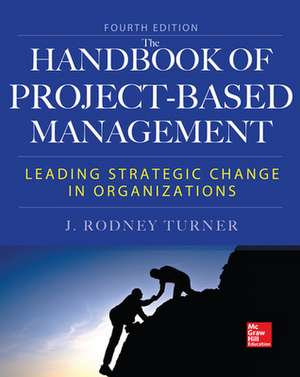Handbook of Project-Based Management, Fourth Edition
Autor Rodney Turneren Limba Engleză Hardback – 16 iun 2014
The Most Complete, Current Guide to Project-Based Management
Thoroughly revised and reorganized, The Handbook of Project-Based Management, Fourth Edition focuses on the role of the global project manager in today's high-tech, hyperconnected environment of continuous improvement and innovation. Rodney Turner, editor of the International Journal of Project Management, explains how to implement a proven, structured approach to achieving performance improvement through strategic change. This practical resource describes how to align project goals with organizational goals, maintain governance, and manage project performance and process. An all-new case study runs throughout the book, demonstrating real-world applications of the concepts presented.Coverage includes:
- Leading change
- Beneficial change
- Project governance
- Program and portfolio management
- Governance of the projectbased organization
- Organizational capability
- Scope
- Project organization
- Stakeholders
- Quality
- Cost
- Time
- Risk
- Process models
- Start-up
- Execution and control
- Close-out
Preț: 610.77 lei
Preț vechi: 886.82 lei
-31% Nou
Puncte Express: 916
Preț estimativ în valută:
116.89€ • 121.58$ • 96.50£
116.89€ • 121.58$ • 96.50£
Carte tipărită la comandă
Livrare economică 17-22 aprilie
Preluare comenzi: 021 569.72.76
Specificații
ISBN-13: 9780071821780
ISBN-10: 0071821783
Pagini: 368
Dimensiuni: 191 x 234 x 25 mm
Greutate: 0.79 kg
Ediția:Revised
Editura: McGraw Hill Education
Colecția McGraw-Hill
Locul publicării:United States
ISBN-10: 0071821783
Pagini: 368
Dimensiuni: 191 x 234 x 25 mm
Greutate: 0.79 kg
Ediția:Revised
Editura: McGraw Hill Education
Colecția McGraw-Hill
Locul publicării:United States
Cuprins
1. Leading Change Thru Projects
Projects and their management; The process approach; Images of projects; The management of projects and this bookPART I: Managing the Context
2. Projects for Delivering Beneficial Change
Identifying the need for performance improvement; Diagnosing the change required; The benefits map; Linking corporate strategy to project strategy
3. Project Success and Strategy
Project strategy; Judging success; Leading performance indicators; Achieving success
4. The People Involved
Reactions to change; Engaging with stakeholders; Project teams; Leadership
Part II: Managing Performance
5. Managing Scope
Principles of scope management; Project definition; Planning at the strategic level - milestone plans; Lower level plans: activity planning; Applications
6. Managing Organization
Principles; The external organization; The internal organization; Responsibility charts
7. Managing Quality
Quality in the context of projects; Achieving quality on projects; Configuration management
8. Managing Cost
Types of estimates; Estimating costs; Estimating techniques; Controlling costs: obtaining value for money
9. Managing Time
The time schedule; Estimating duration; Calculating the schedule with networks; Resource histograms and resource smoothing; Controlling time
10. Managing Risk
The risk management process; Identifying, Assessing, Analyzing and Managing risk
Part III: Managing the Process
11. The Project Life Cycle
The project as an algorithm; The product life-cycle; The project life-cycle; The management process
12. Project Start-Up
Start-up process; Workshops; Project definition report and manual;Business case
13. Project Control
Requirements for effective control; Gathering data and calculating progress; Taking action
14. Project Close-Out
Timely & efficient completion; Transferring the asset to users; Embedding the change and obtaining benefit; Disbanding the team; Post completion reviews
15. Project Governance
Governance of the project; The principal-agent relationship; Communication between the project manager and sponsor
16. Program/Portfolio Management
Managing portfolios; Managing programs; The project office
17. Developing Organizational Capability
Developing individual competence; Four practices/processes for developing organizational capability; Four areas of knowledge management; Competency traps
Projects and their management; The process approach; Images of projects; The management of projects and this bookPART I: Managing the Context
2. Projects for Delivering Beneficial Change
Identifying the need for performance improvement; Diagnosing the change required; The benefits map; Linking corporate strategy to project strategy
3. Project Success and Strategy
Project strategy; Judging success; Leading performance indicators; Achieving success
4. The People Involved
Reactions to change; Engaging with stakeholders; Project teams; Leadership
Part II: Managing Performance
5. Managing Scope
Principles of scope management; Project definition; Planning at the strategic level - milestone plans; Lower level plans: activity planning; Applications
6. Managing Organization
Principles; The external organization; The internal organization; Responsibility charts
7. Managing Quality
Quality in the context of projects; Achieving quality on projects; Configuration management
8. Managing Cost
Types of estimates; Estimating costs; Estimating techniques; Controlling costs: obtaining value for money
9. Managing Time
The time schedule; Estimating duration; Calculating the schedule with networks; Resource histograms and resource smoothing; Controlling time
10. Managing Risk
The risk management process; Identifying, Assessing, Analyzing and Managing risk
Part III: Managing the Process
11. The Project Life Cycle
The project as an algorithm; The product life-cycle; The project life-cycle; The management process
12. Project Start-Up
Start-up process; Workshops; Project definition report and manual;Business case
13. Project Control
Requirements for effective control; Gathering data and calculating progress; Taking action
14. Project Close-Out
Timely & efficient completion; Transferring the asset to users; Embedding the change and obtaining benefit; Disbanding the team; Post completion reviews
15. Project Governance
Governance of the project; The principal-agent relationship; Communication between the project manager and sponsor
16. Program/Portfolio Management
Managing portfolios; Managing programs; The project office
17. Developing Organizational Capability
Developing individual competence; Four practices/processes for developing organizational capability; Four areas of knowledge management; Competency traps







